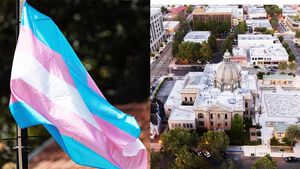SCOTUS Just Voted to Limit LGBTQ+ Protections in Discrimination Ruling
SCOTUS Just Voted to Limit LGBTQ+ Protections in Discrimination Ruling

Discriminating Against LGBTQ+ People Is OK, Supreme Court Says
The Supreme Court just dropped a decision with major ramifications for queer folks.

Ryan Adamczeski
Ryan is a reporter at The Advocate, and a graduate of New York University Tisch's Department of Dramatic Writing, with a focus in television writing and comedy. She first became a published author at the age of 15 with her YA novel "Someone Else's Stars," and is now a member of GALECA, the LGBTQ+ society of entertainment critics, and the IRE, the society of Investigative Reporters and Editors. Her first cover story, "Meet the young transgender teens changing America and the world," has been nominated for Outstanding Print Article at the 36th GLAAD Media Awards. In her free time, Ryan likes watching the New York Rangers and Minnesota Wild, listening to the Beach Boys, and practicing witchcraft.
Ryan is a reporter at The Advocate, and a graduate of New York University Tisch's Department of Dramatic Writing, with a focus in television writing and comedy. She first became a published author at the age of 15 with her YA novel "Someone Else's Stars," and is now a member of GALECA, the LGBTQ+ society of entertainment critics, and the IRE, the society of Investigative Reporters and Editors. Her first cover story, "Meet the young transgender teens changing America and the world," has been nominated for Outstanding Print Article at the 36th GLAAD Media Awards. In her free time, Ryan likes watching the New York Rangers and Minnesota Wild, listening to the Beach Boys, and practicing witchcraft.
























































































